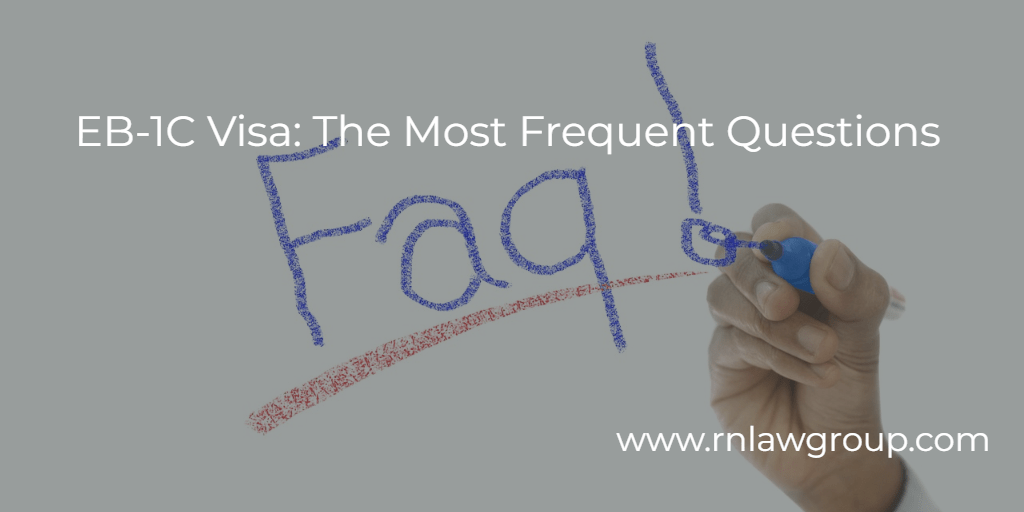
EB-1C Visa: The Most Frequent Questions
The EB-1C visa is a popular option for multinational executives and managers seeking permanent residence in the United States. It is part of the EB-1 category of employment-based green cards, which are designed for individuals with extraordinary abilities, outstanding professors and researchers, and multinational managers and executives. The EB-1C, in particular, provides a direct pathway to a green card for individuals who have been employed abroad in an executive or managerial capacity and are now being transferred to a U.S.-based company.
Given the complexities involved in this process, applicants and employers often have several questions. Below are some of the most frequently asked questions about the EB-1C visa.
- What is the EB-1C Visa?
The EB-1C is an employment-based immigrant visa intended for multinational executives and managers. It allows these individuals to become permanent residents of the United States. To qualify, the individual must have been employed in a managerial or executive position for at least one of the previous three years by a qualifying foreign company and must be transferred to a U.S. company that is affiliated with the foreign company.
- What are the Requirements for EB-1C?
The primary requirements for the EB-1C visa include:
- Employment in a Managerial or Executive Position: The applicant must have worked as a manager or executive for at least one year in the three years before the application.
- Qualifying Relationship: The U.S. employer must have a qualifying relationship with the foreign company, such as a parent, subsidiary, branch, or affiliate.
- Ongoing Employment Offer: The U.S. company must offer the applicant a full-time job in an executive or managerial capacity.
Additionally, the U.S. company must be operating for at least one year and be financially capable of supporting the executive or manager.
- What is Considered a Managerial or Executive Role?
The definitions of “managerial” and “executive” are critical for determining eligibility.
- Executive Capacity refers to the ability to make decisions of wide latitude without much supervision. Executives typically have substantial control over the organization’s policies and goals.
- Managerial Capacity involves managing a team or department, controlling important functions of the organization, or having the authority to hire and fire employees.
These roles must involve significant authority and decision-making responsibilities within the organization.
- Do I Need a Labor Certification for EB-1C?
No, the EB-1C visa does not require labor certification. Labor certification is a process that typically involves proving that no qualified U.S. workers are available for the job, which can be time-consuming. The EB-1C visa bypasses this requirement, making it a more streamlined option for multinational executives and managers.
- Can I Apply for EB-1C if I am Already in the U.S.?
Yes, if you are already in the United States, you can apply for an EB-1C visa through adjustment of status. Adjustment of status allows individuals already in the U.S. under a temporary visa, such as an L-1A, to change their status to permanent resident without having to leave the country.
- How Long Does the EB-1C Process Take?
The processing time for an EB-1C application can vary depending on several factors, including:
- USCIS Processing Times: The U.S. Citizenship and Immigration Services (USCIS) may take several months to review your petition.
- Priority Dates: For applicants from countries with a high demand for green cards, such as India or China, there may be a waiting period for a visa number to become available.
- Company Structure: Delays may occur if USCIS requires additional evidence regarding the U.S. or foreign company’s business operations.
Typically, the process can take anywhere from 6 months to several years, depending on these factors.
- What Documents Are Required for an EB-1C Petition?
The following documents are generally required to support an EB-1C petition:
- Evidence of the qualifying relationship between the U.S. and foreign company (e.g., organizational charts, financial statements).
- Proof that the foreign and U.S. companies are operational.
- Documentation showing the individual’s managerial or executive role, including job descriptions, organizational charts, and evidence of the individual’s authority.
- A detailed job offer from the U.S. company outlining the individual’s managerial or executive duties.
It’s essential to provide comprehensive documentation to demonstrate that both the company and the individual meet the EB-1C requirements.
- Is the L-1A Visa a Requirement for EB-1C?
No, an L-1A visa is not required to apply for EB-1C. However, many EB-1C applicants first come to the U.S. on an L-1A visa, which is a nonimmigrant visa for executives and managers. The L-1A visa can serve as a temporary stepping stone for individuals who plan to later apply for permanent residence through the EB-1C category.
- What Happens if My EB-1C Application is Denied?
If your EB-1C application is denied, you will receive a notice from USCIS explaining the reasons for the denial. Common reasons for denials include insufficient evidence of the qualifying relationship between the U.S. and foreign companies or failure to prove that the applicant’s role is genuinely managerial or executive.
You may be able to file an appeal or motion to reopen/reconsider the case, depending on the reason for the denial. In some cases, it may be advisable to refile the application with stronger supporting documentation.
- Can My Family Members Apply with Me?
Yes, your spouse and unmarried children under the age of 21 can apply for permanent residence along with you under the EB-1C category. Once your EB-1C petition is approved, they can apply for derivative green cards.
Your spouse may also be eligible for employment authorization while their green card application is being processed, allowing them to work in the U.S. during this period.
- How Does EB-1C Compare to EB-2 and EB-3 Categories?
One of the major advantages of the EB-1C visa over the EB-2 and EB-3 categories is that it does not require labor certification. Additionally, the EB-1C category typically has shorter waiting times, particularly for applicants from countries that do not have a backlog of applicants.
While the EB-2 and EB-3 categories may be available for other professionals, the EB-1C is specifically designed for multinational executives and managers, which can make it a more suitable option for those who meet the qualifications.
- What if My U.S. Company is a Startup?
If your U.S. company is a startup, the EB-1C application can be more challenging. USCIS will require proof that the company is financially stable and has the operational capacity to support an executive or manager. This may be difficult to demonstrate for a new company, but it’s not impossible.
Startups applying for EB-1C visas should be prepared to provide evidence of funding, business plans, and operational milestones that indicate long-term viability.
Conclusion:
The EB-1C visa is an attractive option for multinational executives and managers looking to obtain permanent residence in the United States. By understanding the requirements and preparing a well-documented application, individuals can navigate the process successfully and secure a green card for themselves and their families.
By: Felipe Jimenez
Felipe Jimenez is an Associate Attorney at Reddy Neumann Brown P.C. He works in the Non-Immigrant Visa (NIV) Department where he assists clients through all phases of the non-immigrant visa process.
Reddy Neumann Brown P.C. has been serving the business community for over 20 years and is Houston’s largest immigration law firm focused solely on US. Employment-based immigration. We work with both employers and their employees, helping them navigate the immigration process quickly and cost-effectively.

